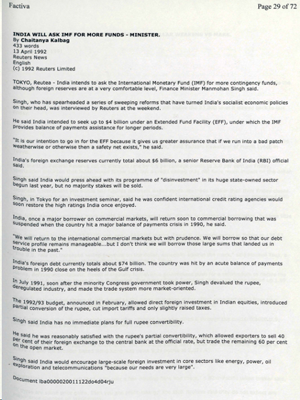INDIA WILL ASK IMF FOR MORE FUNDS – MINISTER
[Reuters]
Published date: 13th Apr 1992
13 April 1992
Reuters News
English
(c) 1992 Reuters Limited
TOKYO, Reuters – India intends to ask the International Monetary Fund (IMF) for more contingency funds, although foreign reserves are at a very comfortable level, Finance Minister Manmohan Singh said.
Singh, who has spearheaded a series of sweeping reforms that have turned India’s socialist economic policies on their head, was interviewed by Reuters at the weekend.
He said India intended to seek up to $4 billion under an Extended Fund Facility (EFF), under which the IMF provides balance of payments assistance for longer periods.
“It is our intention to go in for the EFF because it gives us greater assurance that if we run into a bad patch weatherwise or otherwise then a safety net exists,” he said.
India’s foreign exchange reserves currently total about $6 billion, a senior Reserve Bank of India (RBI) official said.
Singh said India would press ahead with its programme of “disinvestment” in its huge state-owned sector begun last year, but no majority stakes will be sold.
Singh, in Tokyo for an investment seminar, said he was confident international credit rating agencies would soon restore the high ratings India once enjoyed.
India, once a major borrower on commercial markets, will return soon to commercial borrowing that was suspended when the country hit a major balance of payments crisis in 1990, he said.
“We will return to the international commercial markets but with prudence. We will borrow so that our debt service profile remains manageable … but I don’t think we will borrow those large sums that landed us in trouble in the past.”
India’s foreign debt currently totals about $74 billion. The country was hit by an acute balance of payments problem in 1990 close on the heels of the Gulf crisis.
In July 1991, soon after the minority Congress government took power, Singh devalued the rupee, deregulated industry, and made the trade system more market-oriented.
The 1992/93 budget, announced in February, allowed direct foreign investment in Indian equities, introduced partial conversion of the rupee, cut import tariffs and only slightly raised taxes.
Singh said India has no immediate plans for full rupee convertibility.
He said he was reasonably satisfied with the rupee’s partial convertibility, which allowed exporters to sell 40 per cent of their foreign exchange to the central bank at the official rate, but trade the remaining 60 per cent on the open market.
Singh said India would encourage large-scale foreign investment in core sectors like energy, power, oil exploration and telecommunications “because our needs are very large”.






